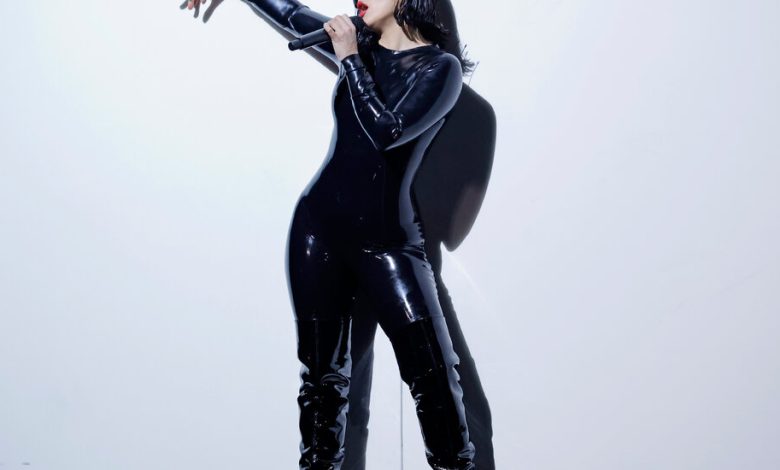At the Latin Grammys, Youth and Age Were Both Welcome

The 23rd annual Latin Grammy Awards split their bounty on Thursday night — a sensible choice given the geographic, generational and sonic diversity of Latin music. In a show broadcast from Las Vegas on Univision, multiple awards went to three very disparate songwriters: the literary-minded Jorge Drexler from Uruguay, with six; the genre-crossing hitmaker Bad Bunny from Puerto Rico, who won five; and the chameleonic, style-mashing Rosalía from Spain, who earned four.
Bad Bunny amassed awards including best urban album for his blockbuster “Un Verano Sin Ti” (“A Summer Without You”), but was absent from the ceremony, on tour in South America, to the audible disappointment of the audience at the Michelob Ultra Arena. Drexler collected awards for songs in both Spanish and Portuguese, and he returned to the stage so often that by the time he picked up the trophy for song of the year, for “Tocarte” (“To Touch You”), he asked the presenters, “Are you sure?” He noted that the song, a collaboration with the Spanish singer and rapper C. Tangana, was written in just six hours.
Rosalía, who performed a medley that leaped from a piano ballad to gunfire sounds to a warning about the treachery of fame to a peppy merengue, was in tears as she accepted the album of the year award for “Motomami.” She said it was an album she had to fight for, and thanked listeners for staying with her because, she said, “My music is always changing.”
Compared to the flashiness and giddiness of some past Latin Grammy spectacles, this year’s edition was closer to the levelheaded side. Grounding the show in craftsmanship, there were multiple tributes to the four-decade career of the Mexican songwriter Marco Antonio Solís, whose songs about stormy romances span pop, rock and mariachi. The broadcast opened with acts from across Latin America singing his songs; he also performed on his own and, later, with Los Bukis, the band he started in the 1970s and reunited after a quarter-century gap.
As usual, the Latin Grammys were a showcase for impassioned, dynamic live voices. Marc Anthony (who won best salsa album) pushed the high-powered salsa of “Mala” (“Bad”) to the edge of a howl, and Christina Aguilera and the Mexican songwriter Christian Nodal (best ranchero/mariachi album) wrung drama and melismas from “Cuando Me Dé la Gana” (“When I Feel Like It”), from her second Spanish-language album, “Aguilera” (best traditional pop vocal album). Romeo Santos sang the grandly self-pitying bachata “Bebo” (“I Drink”), whose narrator threatens to drink himself to death, on a stage set littered with empty bottles; as it ended, a screen caption reminded viewers not to drink and drive.
Then again, there was the pairing of the Mexican singer Chiquis (who won the best banda — Mexican brass band — award) and Banda Los Recoditos. Chiquis was introduced as a woman who had triumphed in a male-dominated genre, but onstage, the male singers in Banda Los Recoditos strove to out-shout her.
The show made an earnest effort to feature young musicians. “Baloncito Viejo” (“Old Ball”), a duet by the Colombian songwriters Carlos Vives (who won best contemporary tropical album) and Camilo, took on jaunty four-part harmonies as the Colombians were joined by two best new artist nominees, Nicole Zignago (from Peru) and Silvana Estrada (from Mexico). The Puerto Rican singer Nicky Jam was backed by virtuosic students who got music scholarships from the Latin Grammy Cultural Foundation.
Each year, the Latin Grammys try crossovers with performers from English-speaking pop. The guests on Thursday played translator: John Legend in a duet with Sebastian Yatra on the best pop song winner, “Tacones Rojos” (“Red High Heels”), and Elvis Costello adding English lyrics and distorted, reverbed lead guitar to Drexler’s “Tocarte,” as backup singers in white jumpsuits pecked at samplers on white plinths, looking like lab technicians.
The best new artist award was a heartwarming tie. One winner was Estrada, who plays pensive, largely acoustic songs using a guitar-like Venezuelan cuatro. The other was Angela Álvarez, a 95-year-old great-grandmother who was born in Cuba, immigrated to the United States in the 1960s and eventually got a chance to record her own songs through the encouragement of a grandson. She was the oldest performer to win a Latin Grammy. “Although life is difficult, there is always a way out, and with faith and love you can achieve it, I promise you,” she said as she accepted the award. “It’s never too late.”
At a preshow, online ceremony, where most of the awards were given, Liniker won the award for Brazilian popular music (known as MPB in Portuguese); she was the first openly transgender winner of a Latin Grammy, and drew a standing ovation. It was one sign that while awards shows are inevitably distorted, incomplete and open to argument, the Latin Grammys this year struck a satisfying balance of longstanding traditions and genre-stretching possibilities.
